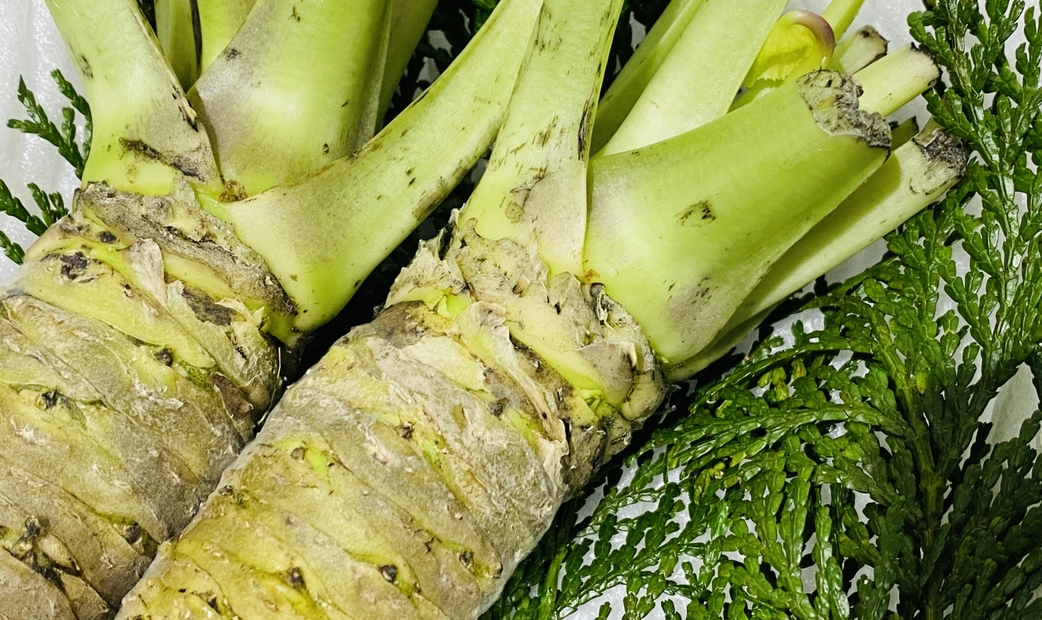
What’s the Difference Between Real and Fake Wasabi?
The OMAKASE editorial team, an official Michelin partner, introduces restaurants in Tokyo where you can savor both imitation and authentic wasabi.
Real Wasabi vs. Fake Wasabi
Most people don’t realize that the wasabi they eat isn’t actually the real thing. In fact, most wasabi served both in Japan and abroad is not genuine wasabi but rather an alternative (known as "Western wasabi") made from horseradish mixed with food coloring. You can safely assume that the majority of wasabi you encounter falls into this category.
Western wasabi is significantly spicier and more pungent, making it a suitable match for Western-style meat dishes. However, its intense heat can overwhelm the delicate flavors of traditional Japanese sushi, masking and disrupting the authentic taste. In contrast, real wasabi has a much milder spice, accompanied by a subtle fruity sweetness and a unique, refreshing aroma. However, genuine wasabi is extremely rare and hard to come by due to its limited production.
Varieties of Wasabi Used in Real Wasabi
Misho Wasabi
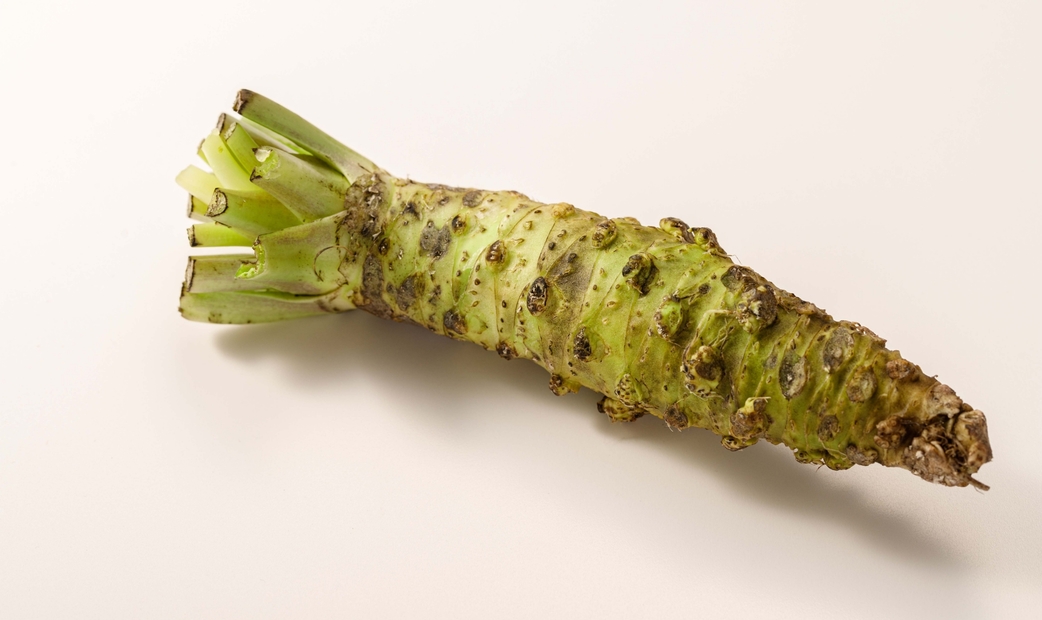
Misho wasabi is known for its relatively fast growth, vibrant green color, and higher moisture content. It has a bold, spicy flavor and a refreshing aroma that stimulates the appetite. It is a versatile ingredient, often used in snacks and dressed dishes.
Mazuma Wasabi
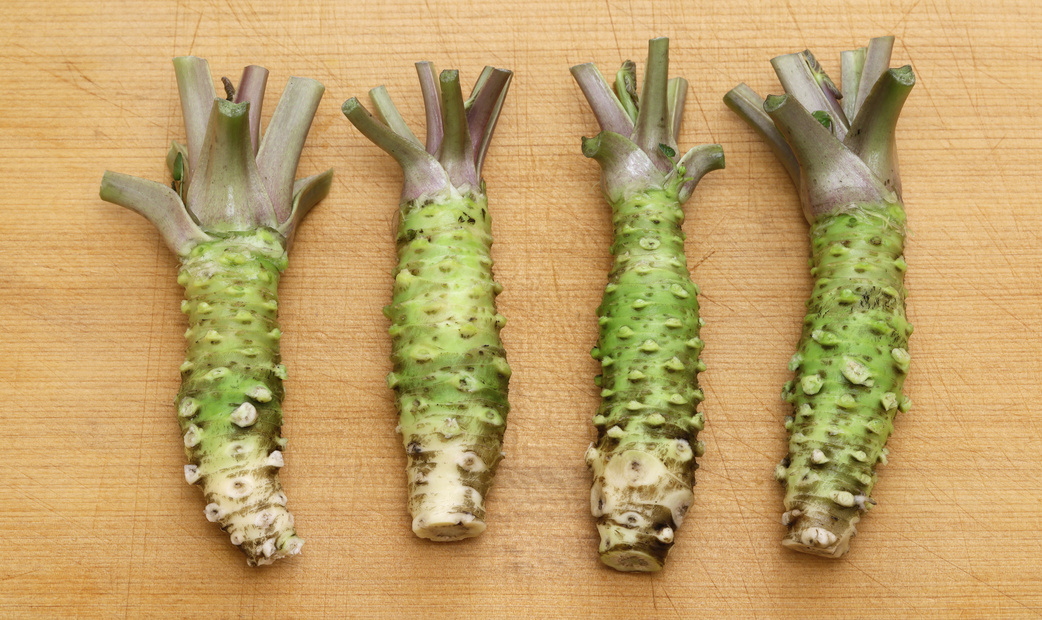
Mazuma wasabi matures slowly, taking about three years to reach harvest. This slow growth makes it a highly prized and luxurious ingredient. Its unique balance of aroma, spiciness, sweetness, and bitterness, combined with its sticky texture, gives it a deep, complex flavor. At high-end sushi restaurants, chefs often choose between Misho and Mazuma wasabi depending on the dish, showcasing the distinct characteristics of each.
Types of Wasabi Used in Sushi
Authentic Wasabi
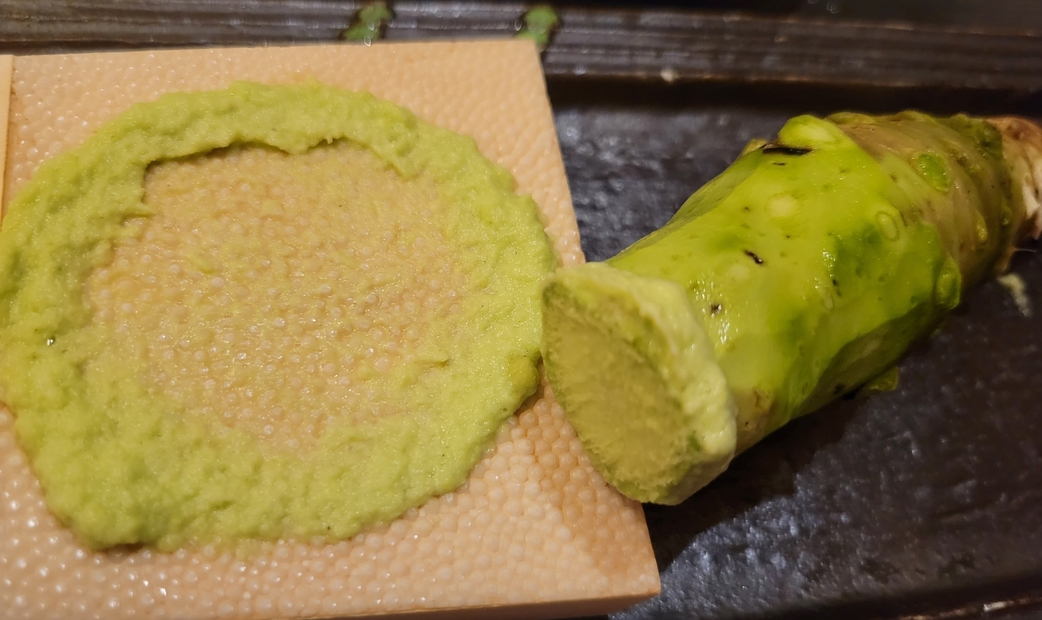
Genuine wasabi is exclusively used at high-end sushi restaurants. Due to its rarity, it is not commonly distributed on the market and is mainly supplied to upscale dining establishments.
Alternative Wasabi
Dissolved Wasabi Powder
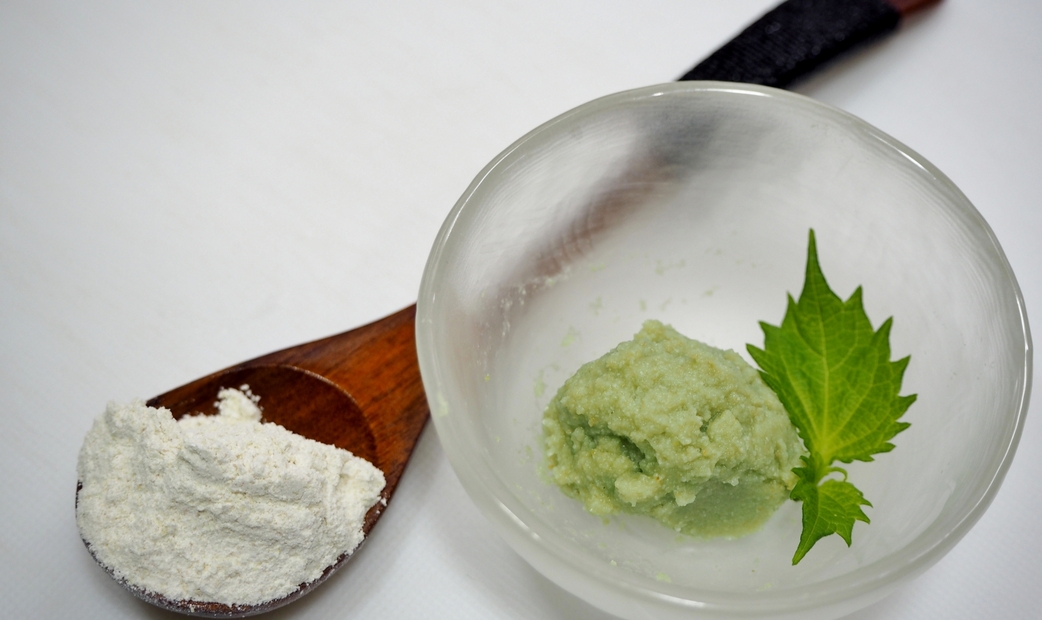
Dissolved wasabi powder is made by mixing dried horseradish powder, food coloring, and water. This is likely the type of wasabi found in most places in the United States.
Packet Wasabi
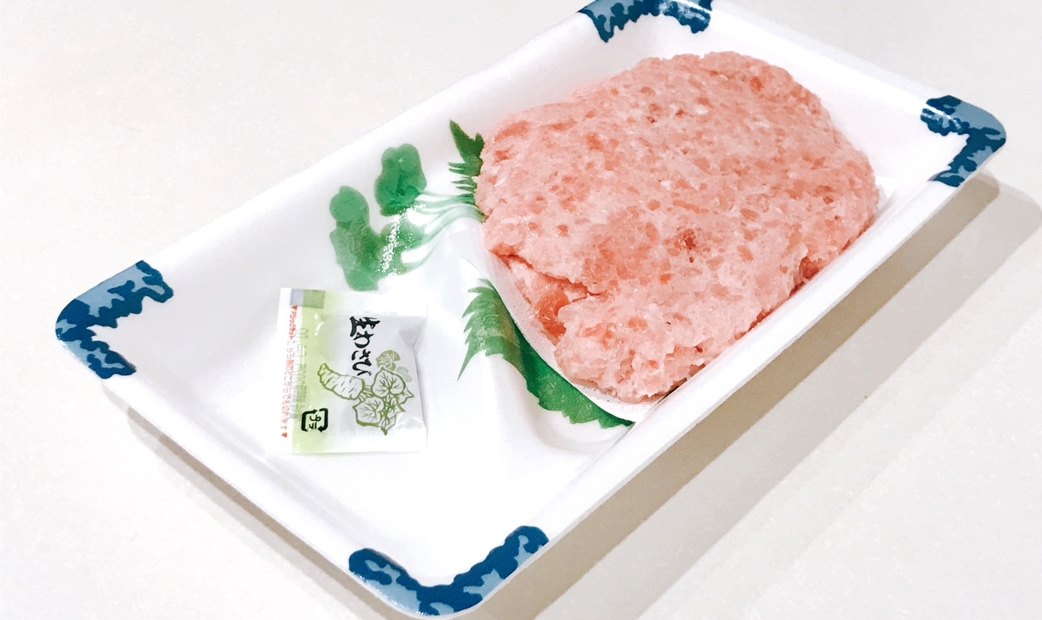
Packet wasabi is primarily made with Western horseradish, with a small amount of real wasabi added to incorporate its flavor.
Tube Wasabi
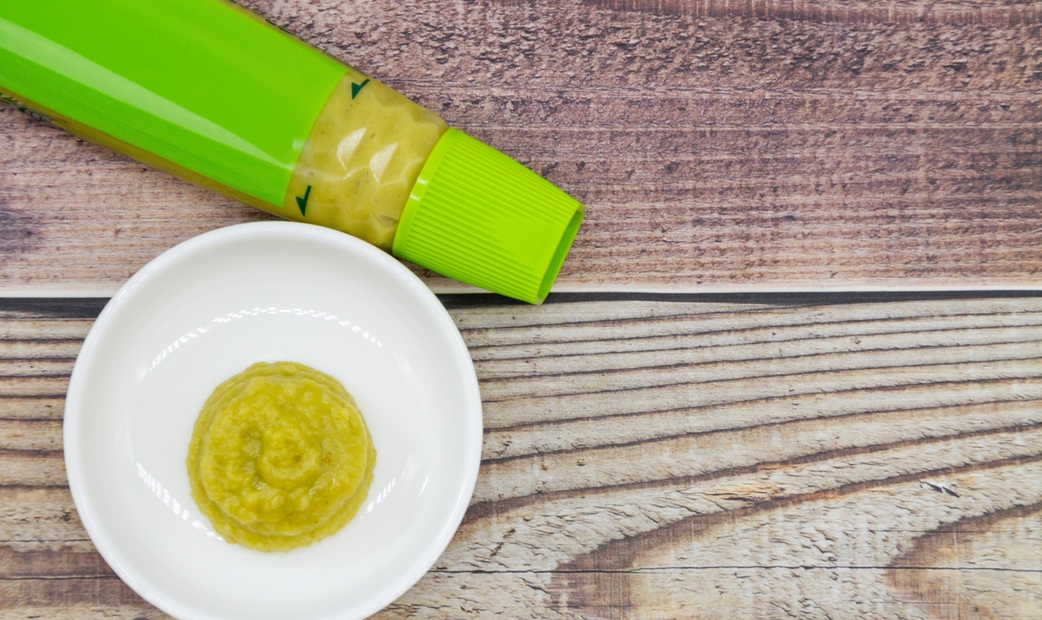
Tubes labeled as 'Hon Wasabi' contain authentic wasabi, whereas those labeled as 'Nama Wasabi' are simply a blend of Western horseradish and Japanese wasabi. It’s important to be mindful of this distinction.
Why Is Wasabi Used in Sushi?
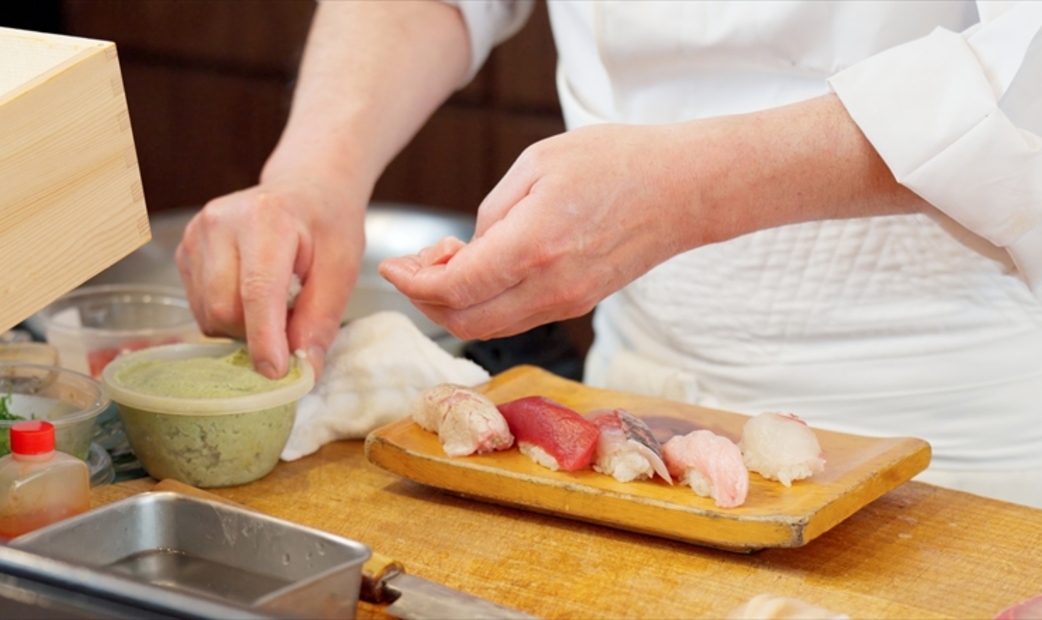
The tradition of adding wasabi to sushi dates back approximately 200 years. At that time, refrigeration was underdeveloped, making it difficult to preserve raw fish. To prevent food poisoning and mask the fishy odor, wasabi was used for its natural antibacterial properties and its ability to neutralize unpleasant smells.
Today, with modern refrigeration techniques, the role of wasabi has changed. It’s no longer about preservation, but rather about enjoying the unique flavor of wasabi alongside the sushi.
For Those Who Dislike Wasabi
For young children or those who dislike wasabi, it’s best to order "sabi-nuki" (without wasabi) at sushi restaurants. Many conveyor belt sushi spots (kaiten-zushi) offer wasabi-free options by default or allow you to specify your preference. A helpful etiquette tip: If your sushi already has wasabi and you wish to remove it, avoid peeling off the fish to scrape it out, as this is considered poor manners.
Best Way to Enjoy Wasabi with Sushi
At high-end sushi restaurants, the perfect amount of wasabi is carefully applied between the fish (neta) and the rice (shari) to enhance the taste. If wasabi and soy sauce are served separately, avoid mixing the wasabi directly into the soy sauce. Doing so not only spoils the appearance but also diminishes the fresh, sharp flavor of the wasabi.
Places to Enjoy Authentic Wasabi
To experience genuine wasabi, visiting a high-end sushi restaurant is your best option. Real wasabi is so rare that it almost never appears on the general market, with most of it being supplied directly to upscale sushi establishments and top-tier dining spots.
Although tube wasabi is readily available in stores, freshly grated wasabi is far superior in taste and aroma. As such, it is highly recommended to enjoy wasabi directly at a restaurant.
The Art of Wasabi at High-End Sushi Restaurants
In high-end sushi restaurants, wasabi is handled with exceptional care and craftsmanship. One subtle technique involves allowing freshly grated wasabi to rest briefly before use. This helps to soften the spiciness and bring out a mild sweetness. However, resting it too long can diminish its signature aroma, which is why each restaurant has its own approach. Some restaurants even carefully select the type of wasabi they believe best complements the specific sushi they serve.
Wasabi Maki Sushi: Namida Maki
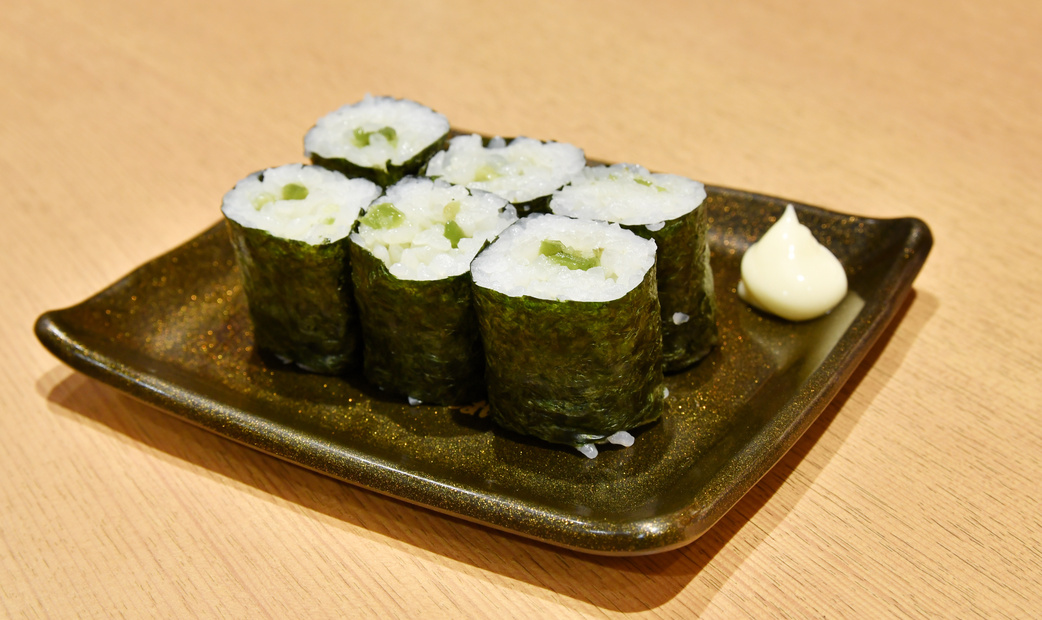
While wasabi typically plays a supporting role in sushi, the Namida Maki is where wasabi takes center stage. This unique sushi roll features freshly grated wasabi or finely chopped wasabi stems and leaves as the main ingredient. The sharp, pungent spiciness hits the nose, creating a tingling sensation. The name "Namida" (meaning "tears" in Japanese) hints at the intense heat that can bring tears to your eyes.
Places to Taste Authentic Wasabi Sushi in Tokyo
Nagatacho Sushi Kanesaka (永田町 鮨かねさか)/ Sushi
Nagatacho Sushi Kanesaka is a branch of the renowned Ginza Kanesaka, a two-star Michelin restaurant. This prestigious sushi restaurant uses authentic mountain wasabi, expertly cultivated over two years in pristine water and air. The perfect harmony between the fish (neta), rice (shari), and wasabi is diligently pursued. The chefs carefully calculate the temperature, humidity, and aging of each ingredient to ensure every piece of sushi achieves perfect balance.
One of the restaurant's signature dishes is the "Abalone Risotto", a luxurious creation bursting with umami. The setting, a stately standalone house, adds to the restaurant's refined charm.
- Operation hours
- Lunch: 12:00 PM - 2:00 PM
Dinner: Part1 5:00 PM - 7:30 PM / Part2 7:30 PM - 10:00 PM (Last order 9:30 PM) - Regular holiday
- Mondays and Sundays every other week
- Price range
-
Lunch: USD 127.94 - USD 230.28
Dinner: USD 230.28 - USD 230.28 - Address
- 2-7-9 Nagata-cho, Chiyoda-ku, Tokyo
- Nearest station
- Kokkai-gijidomae station, Tameike-sanno station, Nagatacho station
- Directions from station
- 1 minute walk from Kokkai-gijidomae Station
2 minutes walk from Exit 5 of Tameike-Sanno Station
6 minutes walk from Exit 1 of Nagatacho Station - Payment methods
- Cash, Credit card available
- Total Seats
- 8 Seats
-
Jimmy Morton5.0Posted on :09/20/2024
-
Ho5.0Posted on :07/26/2024
Sushi Masashi (鮨 将司) / Sushi
This one-star Michelin restaurant is led by a chef who trained at The Ritz-Carlton and the renowned "Sushi Wakon". The course menu is carefully crafted with a focus on temperature, texture, and fat composition. Be sure to try the signature dish, "Tuna Sukiyaki".
- Operation hours
- Lunch: 12:00 PM -
Dinner: 5:30 PM - 8:00 PM - Regular holiday
- Wednesdays, Sundays, Public Holidays (Others, Irregular Holidays)
- Price range
-
Lunch: USD 271.38 - USD 310.15
Dinner: USD 271.38 - USD 310.15 - Address
- 7F, Gaien Icho no Mori, 2-9-9 Kita-Aoyama, Minato-ku, Tokyo
- Nearest station
- Gaienmae Station
- Directions from station
- 3 minutes walk from Gaienmae Station
- Payment methods
- Credit card available
- Total Seats
- Counter 10 Seats
Room 4 Seats - Awards
-
Michelin
-
Clare5.0Posted on :02/10/2026
-
Phlip Leung5.0Posted on :12/16/2025
-
Davide4.8Posted on :11/12/2025
Udatsu Sushi (宇田津 鮨) / Sushi
This Michelin-featured restaurant in Tokyo uniquely combines sushi and art. Guests can enjoy authentic Edo-style sushi crafted from specialty rice and the highest-quality ingredients in an artistic setting. A standout dish is the signature "Herb Maki", known for its unique and innovative flavor.
- Operation hours
- Lunch:
[Mon–Fri] From 12:00 PM
[Sat, Sun & Public Holidays] From 11:00 AM / From 1:00 PM
Dinner:
From 6:00 PM / From 9:00 PM - Price range
-
Lunch: USD 102.35 - USD 255.87
Dinner: USD 127.94 - USD 255.87 - Address
- 2-48-10, Kamimeguro, Meguro-ku, Tokyo
- Nearest station
- Nakameguro Station
- Directions from station
- 5-10 minute's walk from Nakameguro Station
- Payment methods
- Cash, Credit card
- Total Seats
- 1F:9 Counter Seats, 1F 1 Private Room(2~4people)
2F:5 Counter Seats or 2F 1 Private Room(4~8people) - Awards
-
Michelin
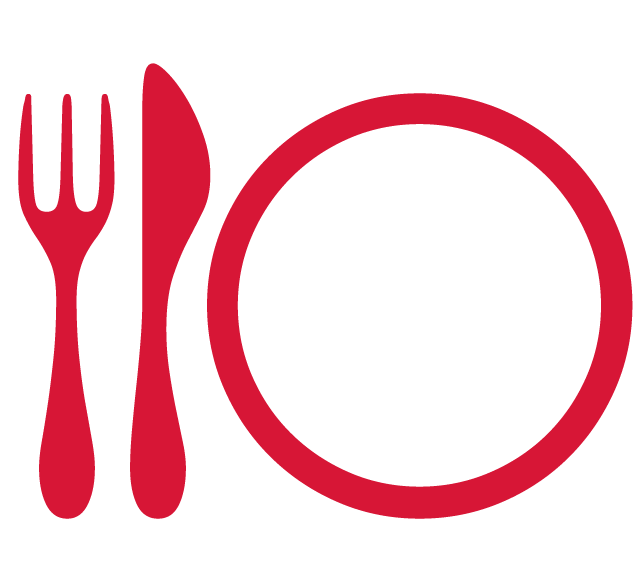
-
TLN-Oz5.0Posted on :12/31/2025
-
Alessandro5.0Posted on :12/27/2025
-
Benjamin5.0Posted on :12/16/2025


